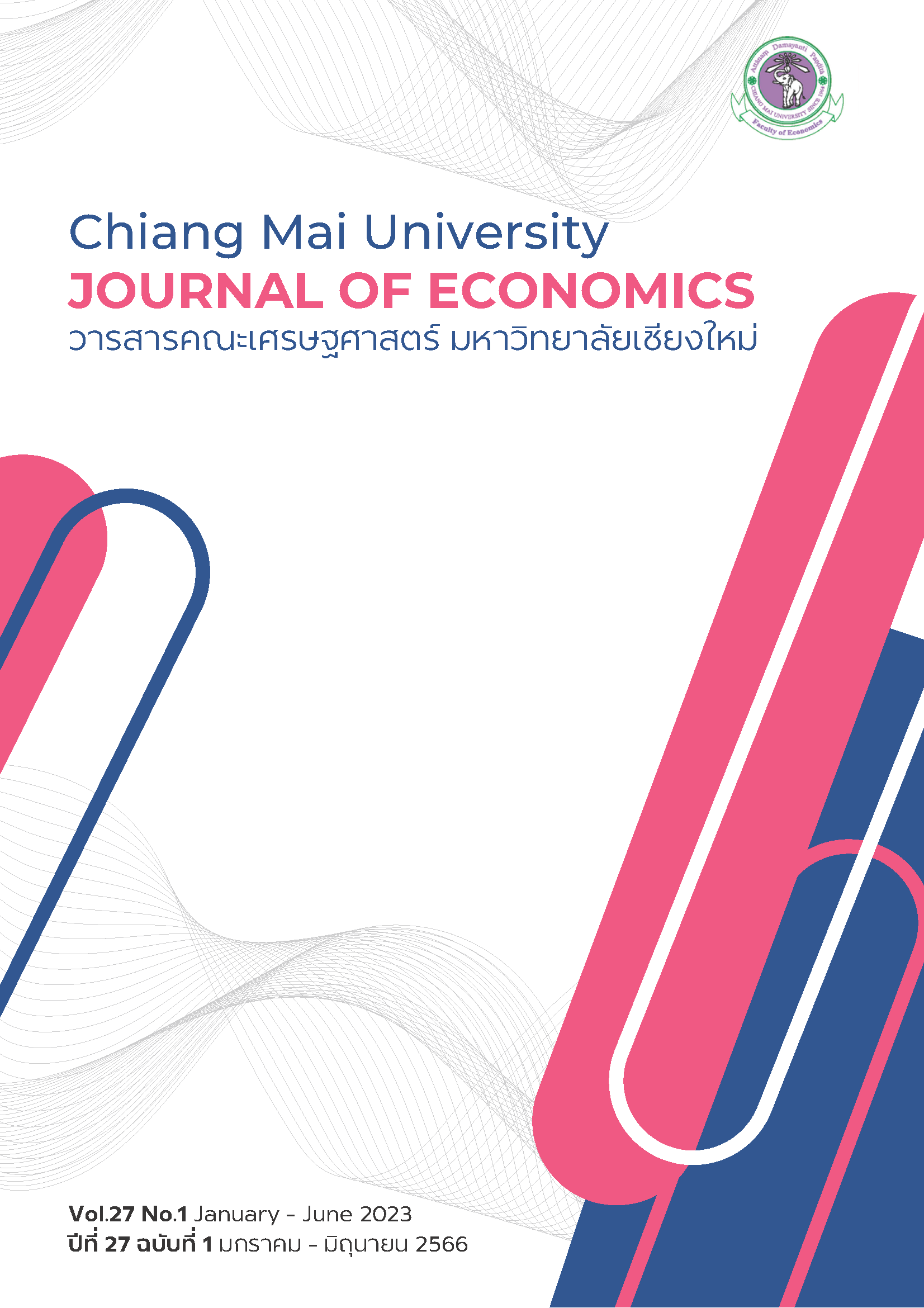Factors Affecting Generation Z Customers’ Intention to Use Cryptocurrency Trading Platforms in Thailand: A Case Study of Bitkub Platform
Keywords:
Intention to Use, Cryptocurrency Trading Platforms, BitkubAbstract
The purpose of this research was to study the factors affecting Generation Z customers’ intention to use cryptocurrency trading platforms in Thailand as a case study of Bitkub platform. The samples used in this study were customers with age between 18 and 29 years. Data collection was conducted by using a convenient sample selection method and questionnaire as a tool for the research. Statistics used in the analysis were frequency, percentage, and multiple linear regression analysis.
The findings found that most of the factors affecting intention to use were perceived risks, perceived usefulness, and corporate image, respectively. Meanwhile, electronic word of mouth did not affect intention to use cryptocurrency trading platforms at the 0.05 level of significance.
Keywords: Intention to Use, Cryptocurrency Trading Platforms, Bitkub
References
กัณฐิกา จิตติจรุงลาภ. (2562). การสื่อสารแบบปากต่อปากอิเล็กทรอนิกส์ต่อพฤติกรรมการซื้อสินค้า.
วารสารระบบสารสนเทศด้านธุรกิจ, 5(2), 43 –65.
กัลยา วานิชย์บัญชา. (2545). การวิเคราะห์สถิติ สถิติสำหรับการบริหารและการวิจัย. พิมพ์ครั้งที่ 6.
กรุงเทพฯ : โรงพิมพ์แห่งจุฬาลงกรณ์มหาวิทยาลัย.
เกียรติกร เทียนธรรมชาติ. (2561). อิทธิพลต่อการตัดสินใจยอมรับใช้เงินดิจิทัล (บิทคอยน์) ของ
ผู้บริโภคกลุ่ม Millennials ในกรุงเทพมหานคร. สืบค้นเมื่อ 10 มีนาคม 2565, เว็บไซต์ : http://ethesisarchive.library.tu.ac.th/thesis/2018/TU_2018_5923036171_7492_9464.pdf
คงพัฒน์ เค้าอ้น. (2560). ราคา ความไว้วางใจ คุณค่าการโฆษณา และการสื่อสารแบบปากต่อปาก
อิเล็กทรอนิกส์ที่ส่งผลต่อความตั้งใจซื้อประกันภัยการเดินทางของผู้บริโภคในกรุงเทพมหานคร.
(การค้นคว้าอิสระปริญญามหาบัณฑิต). มหาวิทยาลัยกรุงเทพ.
ชุลีพร จุมพลหล้า. (2562). ปัจจัยที่มีอิทธิพลต่อความตั้งใจใช้บริการธนาคารอาคารสงเคราะห์
สำนักงานใหญ่. (การค้นคว้าอิสระปริญญามหาบัณฑิต). มหาวิทยาลัยกรุงเทพ.
ธานินทร์ ศิลป์จารุ. (2555). การวิจัยและวิเคราะห์ข้อมูลทางสถิติด้วย SPSS และ AMOS.
นนทบุรี : เอส อาร์พริ้นติ้งแมสโปรดักส์.
นฤพล รัตนวิบูลย์ลาภ. (2564). การยอมรับเทคโนโลยีและการตัดสินใจใช้แอปพลิเคชัน
แพลตฟอร์มเทรดสกุลเงินดิจิทัล (คริปโตเคอเรนซี) ของนักลงทุน First Jobber.
สืบค้นเมื่อ 20 มกราคม 2565, เว็บไซต์ : https://archive.cm.mahidol.ac.th/bitstream
/123456789/4262/1/TP%20BM.076%202564.pdf
นิธินาถ วงศ์สวัสดิ์และปวีณา คำพุกกะ. (2557). ความตั้งใจของผู้ซื้อขายหลักทรัพย์ผ่านอินเทอร์เน็ต.
สมาคมนักวิจัย, 2(19), 56-67.
พณีพรรณ สมบัติ. (2564). ปัจจัยที่มีอิทธิพลต่อความตั้งใจในการใช้งานนวัตกรรมบริการแอปพลิเคชัน
“หมอพร้อม” ในเขตกรุงเทพมหานคร. วารสารการบัญชีและการจัดการ มหาวิทยาลัย
มหาสารคาม, 14(1), 142–159.
พิมลพรรณ ณ สมบูรณ์. (2558). คุณลักษณะเว็บไซต์ การสื่อสารแบบปากต่อปากอิเล็กทรอนิกส์
และภาพลักษณ์สถานที่ท่องเที่ยวที่ส่งผลต่อความตั้งใจเลือกซื้อแพ็กเกจท่องเที่ยวออนไลน์ของ
คนวัยทํางานในกรุงเทพมหานคร. สืบค้นเมื่อ 15 กุมภาพันธ์ 2565, เว็บไซต์ : http://dspace.bu.ac.th/jspui/handle/123456789/2463
ภัทรภร ธนาริยางกูร. (2559). อิทธิพลของการรับรู้ถึงประโยชน์ ความง่ายในการใช้งาน
ความเสี่ยงที่ได้รับจากการใช้งาน และความสอดคล้องกับรูปแบบการใช้ชีวิต
ประจำวันที่ส่งผลต่อความตั้งใจใช้ระบบการชำระเงินแบบดิจิทัลของผู้บริโภค
ในเขตกรุงเทพมหานคร. สืบค้นเมื่อ 1 มีนาคม 2565, เว็บไซต์ : http://dspace.bu.ac.th/bitstream/123456789/2959/1/Phattaraporn.tana.pdf
มนต์ชัย วงษ์กิตติไกรวัล. (2564). Bitcoin ยังน่าลงทุนหรือไม่? เรื่องคริปโทเคอเรนซี
ที่ผู้ประกอบการควรรู้. สืบค้นเมื่อ 18 พฤศจิกายน 2564, เว็บไซต์ : https://www.krungsri.com/th/wealth/krungsri-prime/privileges/articles/invest-bitcoin
รัตนภิมล ศรีทองสุข. (2560). ปัจจัยที่ส่งผลต่อพฤติกรรมการตัดสินใจเข้าร่วมการตลาดเชิงกิจกรรมของ
กลุ่มเจเนอเรชั่นวายและเจเนอเรชั่นแซดในเขตกรุงเทพมหานคร. วารสารการสื่อสารและการจัดการ
นิด้า, 3(1), 14-30.
รัศมิ์ลภัส วรเดชธนันกุล. (2558). ความไว้วางใจ การสื่อสารแบบปากต่อปากเชิงบวก และการรับรู้ถึง
ประโยชน์ที่มีผลต่อความตั้งใจซื้อแพ็กเกจทัวร์ผ่านเว็บไซต์ท่องเที่ยวของผู้บริโภคใน
จังหวัดระยอง. สืบค้นเมื่อ 27 กุมภาพันธ์ 2565, เว็บไซต์ : https://so04.tcithaijo.org/index.php
/jmhs1_s/article/view/249823/172618
ล้วน สายยศและอังคณา สายยศ. (2543). เทคนิคการวิจัยทางการศึกษา. พิมพ์ครั้งที่ 3.
กรุงเทพฯ : สุวีริยาสาส์น.
สกุลชัย เก่งอนันตานนท์. (2565). ดีล ‘GULF-Binance’ อาจสะเทือนเป้าหมายการเติบโตของ Bitkub
ที่ SCBคาดหวังไว้. สืบค้นเมื่อ 22 กุมภาพันธ์ 2565, เว็บไซต์ :
https://thestandard.co/gulf-binance-deal-and-bitkub-scb-deal
อรุษ ศิรินทร์ภาณุ. (2564). การศึกษาเรื่องความสัมพันธ์ระหว่างการรับรู้ประโยชน์ การรับรู้ความ
สะดวกในการใช้งาน การรับรู้ทัศนคติในการใช้งาน และการรับรู้ความตั้งใจในการใช้งาน
แอพพลิเคชั่นทางการเงินในโทรศัพท์มือถือ. สืบค้นเมื่อ 14 มกราคม 2565,
เว็บไซต์ : https://archive.cm.mahidol.ac.th/bitstream/123456789/4108/1/
TP%20BM.023%202564.pdf
Assael, H. (1998). Consumer behavior and marketing action. 6th ed. Cincinnati, Ohio : South-
Western College.
Burmann, C., Schaefer, K. & Maloney, P. (2008). Industry image: its impact on
the brand image of potential employees. Journal of Brand Management,
(3), 159-176.
Cochran, W.G. (1977). Sample Techniques. 3rd ed. New York: John Wiley & Sons Inc.
CoinMarketCap. (2022). Today’s Cryptocurrency Prices by Market Cap. Searching on 18
November 2021, Website : https://coinmarketcap.com
Davis, F.D. (1989). Perceived Usefulness, Perceived ease of use, and user acceptance of
information technology. MIS Quarterly, 13(3), 319-340.
Howard, J.A. (1994). Buyer behavior in marketing strategy. 2nd ed. Englewood Cliffs, New
Jersey : Prentice-Hall.
Ipsos. (2021). 42% of Thais Who Are Interested in Bitcoin Plan to Invest within 1 Year.
Searching on 5 January 2022, Website : https://www.ipsos.com/en-th/42-thais-who-
are-interested-bitcoin-plan-invest-within-1-year
Junadi & Sfenrianto. (2015). A Model of Factors Influencing Consumer’s Intention to Use E-
Payment System in Indonesia. International Conference on Computer Science and
Computational Intelligence (ICCSCI 2015), 59, 214-220.
LeBlance, G. & Nguyen, N. (1996). Cues used by customers evaluating corporate image in
service firms: An empirical study in financial institutions. International Journal of Service
Industry Management, 7(2), 44-56.
Meesuwansukkul, A. (2010). Factor affecting intention behavior to use financial transaction via
G service. Master of Business Administration, Burapha University.
NapoleonCat. (2020). Instagram users in Thailand. Searching on 22 January 2022,
Website : https://napoleoncat.com/stats/instagram-users-in-thailand/2020/09
Neuendorf, Y., & Valdiseri, A. (2016). Consumer acceptance of online banking: an extension of
the technology acceptance model. Internet Research, 14(3), 224-235.
Oliver, R.L. (1999). Whence consumer loyalty. Journal of Marketing, 63, 33-44.
Senariddhikrai, P. (2020). 5 Assumption for regression. Searching on 10 February 2022,
Website : https://www.smartresearchthai.com/post/5-assumption-for-regression
The Standard Wealth. (2021). Dissecting A Financial Statement ‘Bitkub Online’ The Startup
with 1000% Main Growth Until Recognize by SCBX. Searching on 22 January 2022,
Website : https://thestandard.co/bitkub-online
Wen, M. (2018). The Influence of Consumer’s Knowledge, Innovativeness, and Perceived
Risk on their Intention to Use Face Scan Payment. Searching on 22 January 2022, Website : http://dspace.bu.ac.th/bitstream/123456789/4029/1/mengjie_wen.pdf
Winn, C. H. (2019). How Apple Captures Attention of Younger Generations with Music.
Searching on 3 May 2022, Website : https://hollycwinn.com
Zhu, J., Goraya, M.A.S., & Cai, Y. (2018). Retailer– consumer sustainable business
Environment: How consumers’ perceived benefits are translated by the addition
of new retail channels. Sustainability, 10(2959), 1-22.
Downloads
Published
Issue
Section
License
Copyright (c) 2023 CHIANG MAI UNIVERSITY JOURNAL OF ECONOMICS

This work is licensed under a Creative Commons Attribution-NonCommercial-NoDerivatives 4.0 International License.
All opinions and contents in the CMJE are the responsibility of the author(s). Chiang Mai University Journal of Economics reserves the copyright for all published materials. Papers may not be reproduced in any form without the written permission from Chiang Mai University Journal of Economics.






